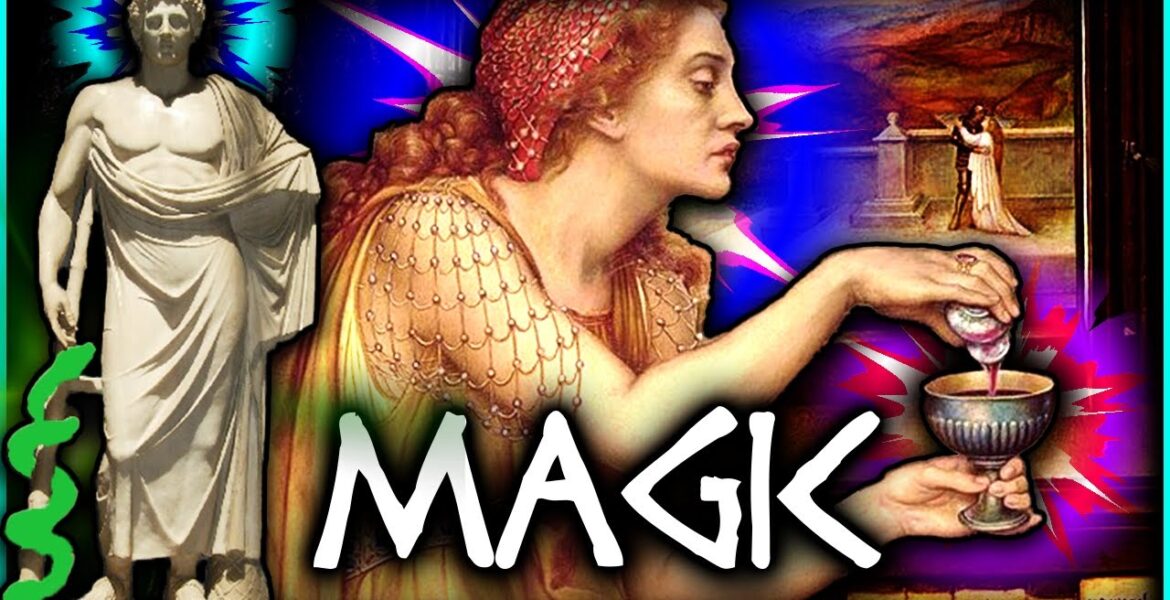In classical antiquity, including the Hellenistic world of ancient Greece and ancient Rome, historians and archaeologists view the public and private rituals associated with religion as part of everyday life. Examples of this phenomenon are found in the various state and cult temples, Jewish synagogues, and churches. These were important hubs for ancient peoples, representing a connection between the heavenly realms (the divine) and the earthly planes (the dwelling place of humanity). This context of magic has become an academic study, especially in the last twenty years.
Pervasive throughout the Eastern Mediterranean and Western Asia until late antiquity and beyond, mágos, “Magian” or “magician”, was influenced by (and eventually displaced) Greek goēs (γόης), the older word for a practitioner of magic, to include astrology, alchemy and other forms of esoteric knowledge.[citation needed] This association was, in turn, the product of the Hellenistic fascination for (Pseudo-)Zoroaster, who was perceived by the Greeks to be the “Chaldean”, founder of the Magi and inventor of both astrology and magic, a meaning that still survives in the modern-day words “magic” and “magician”.
Herodotus, Xenophon, and Plutarch – did use magos in connection with their descriptions of (Zoroastrian) religious beliefs or practices; the majority seem to have understood it in the sense of “magician”. Accordingly, the more sceptical writers then also identified the “magicians” – i.e. individual magians – as charlatans or frauds. In Plato’s Symposium, the Athenians identified them as maleficent, allowing, however, a measure of efficacy as a function of the god Eros. Pliny paints them in a particularly bad light.
According to one source magic in general was held in low esteem and condemned by speakers and writers. Betz notes book burnings in regards to texts such as the Greek Magical Papyri, when he cites Ephesus in the Acts of the Apostles (Acts 19: 10). And on the account of Suetonius, Augustus ordered the burning of 2,000 magical scrolls in 13 BC.
As a result of these acts of suppression, the magicians and their literature went underground. The papyri themselves testify to this by the constantly recurring admonition to keep the books secret.
The religious beliefs and practices of most people were identical with some form of magic, and the neat distinctions we make today between approved and disapproved forms of religion-calling the former “religion” and “church” and the latter “magic” and “cult” – did not exist in antiquity except among a few intellectuals.
It is known that philosophers of the Neopythagorean and Neoplatonic schools, as well as Gnostic and Hermetic groups, used magical books and hence must have possessed copies. But most of their material vanished and what we have left are their quotations.
Religious ritual had the intended purpose of giving a god their just due honor, or asking for divine intervention and favor, while magic is seen as practiced by those who seek only power, and often undertaken based on a false scientific basis.
Ultimately, the practice of magic includes rites that do not play a part in worship, and are ultimately irreligious.
Associations with this term tend to be an evolving process in ancient literature, but generally speaking ancient magic reflects aspects of broader religious traditions in the Mediterranean world, that is, a belief in magic reflects a belief in deities, divination, and words of power.
The concept of magic however came to represent a more coherent and self-reflective tradition exemplified by magicians seeking to fuse varying non-traditional elements of Greco-Roman religious practice into something specifically called magic. This fusing of practices reached its peak in the world of the Roman Empire, in the 3rd to 5th centuries CE.
The magic papyri we have left to study, present more Graeco-Egyptian, rather than Graeco-Roman beliefs. Betz further notes:
In this syncretism, the indigenous ancient Egyptian religion has in part survived, in part been profoundly Hellenised. In its Hellenistic transformation, the Egyptian religion of the pre-Hellenistic era appears to have been reduced and simplified, no doubt to facilitate its assimilation into Hellenistic religion as the predominant cultural reference. It is quite clear that the magicians who wrote and used the Greek papyri were Hellenistic in outlook. Hellenization, however, also includes the Egyptianising of Greek religious traditions. The Greek magical papyri contain many instances of such Egyptianizing transformations, which take very different forms in different texts or layers of tradition.
The article first appeared on Gnostic Informant.
READ MORE: The strange story of how Thebes became the most powerful Greek city-state.

